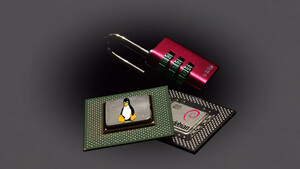Hallo Leute,
folgendes Problem: Ich habe mir eine Creative Sound Blaster Recon3D PCIe zugelegt. Unter Ubuntu habe ich ein zerrendes, quietschendes Geräusch, sobald ein Ton abgespielt wird. (siehe Anhang, könnte laut sein ^^) Dieses Geräusch läuft noch ein paar Sekunden nach Ende des Ton's weiter.
Das ganze habe ich unter U/Kubuntu und jetzt Linux Mint 14 Cinnamon versucht. Ich habe es auch mit der Mainline-Kernel 3.8.6 probiert, ohne Erfolg. Das entfernen der USB-Soundkarte brachte auch nichts. (ROCCAT Kulo USB-Soundkarte) Bei der HDA NVidia handelt es sich denke mal um den HDMI Anschluss meiner GTX570.
Unter openSUSE 12.3 funktioniert die Soundkarte. Dort wird das gleiche Modul (snd_hda_intel) verwendet. Ich muss jedoch bei jedem Neustart die USB-Soundkarte ein mal unter Yast -> Sound primär setzen und übernehmen und danach das gleiche mit der HDA Creative machen, damit dieser Ton aufhört und der richtige abgespielt wird.
Unter Yast -> Sound -> HDA Creative -> Bearbeiten.. waren keine Parameter gesetzt.
Im Anhang befindet sich ebenfalls noch der Output von dmesg.
Hat irgendwer eine Idee warum es unter openSUSE geht, aber unter Ubuntu nicht? Falls mehr Informationen benötigt werden einfach bescheid geben.
Schon mal vielen Dank für's lesen und evtl. Antworten.
Gruß,
Foxeronie
folgendes Problem: Ich habe mir eine Creative Sound Blaster Recon3D PCIe zugelegt. Unter Ubuntu habe ich ein zerrendes, quietschendes Geräusch, sobald ein Ton abgespielt wird. (siehe Anhang, könnte laut sein ^^) Dieses Geräusch läuft noch ein paar Sekunden nach Ende des Ton's weiter.
Das ganze habe ich unter U/Kubuntu und jetzt Linux Mint 14 Cinnamon versucht. Ich habe es auch mit der Mainline-Kernel 3.8.6 probiert, ohne Erfolg. Das entfernen der USB-Soundkarte brachte auch nichts. (ROCCAT Kulo USB-Soundkarte) Bei der HDA NVidia handelt es sich denke mal um den HDMI Anschluss meiner GTX570.
Unter openSUSE 12.3 funktioniert die Soundkarte. Dort wird das gleiche Modul (snd_hda_intel) verwendet. Ich muss jedoch bei jedem Neustart die USB-Soundkarte ein mal unter Yast -> Sound primär setzen und übernehmen und danach das gleiche mit der HDA Creative machen, damit dieser Ton aufhört und der richtige abgespielt wird.
Unter Yast -> Sound -> HDA Creative -> Bearbeiten.. waren keine Parameter gesetzt.
Code:
noname@nomachine ~ $ lsb_release -d
Description: Linux Mint 14 Nadia
noname@nomachine ~ $ uname -r
3.5.0-17-generic
noname@nomachine ~ $ cat /proc/asound/cards
0 [Creative ]: HDA-Intel - HDA Creative
HDA Creative at 0xf7b04000 irq 16
1 [Kulo ]: USB-Audio - ROCCAT Kulo
C-Media Electronics Inc. ROCCAT Kulo at usb-0000:00:1d.0-1.6, full speed
2 [NVidia ]: HDA-Intel - HDA NVidia
HDA NVidia at 0xf7080000 irq 17
noname@nomachine ~ $ aplay -l
**** Liste der Hardware-Geräte (PLAYBACK) ****
Karte 0: Creative [HDA Creative], Gerät 0: CA0132 Analog [CA0132 Analog]
Sub-Geräte: 1/1
Sub-Gerät #0: subdevice #0
Karte 1: Kulo [ROCCAT Kulo], Gerät 0: USB Audio [USB Audio]
Sub-Geräte: 1/1
Sub-Gerät #0: subdevice #0
Karte 2: NVidia [HDA NVidia], Gerät 3: HDMI 0 [HDMI 0]
Sub-Geräte: 1/1
Sub-Gerät #0: subdevice #0
Karte 2: NVidia [HDA NVidia], Gerät 7: HDMI 0 [HDMI 0]
Sub-Geräte: 1/1
Sub-Gerät #0: subdevice #0
Karte 2: NVidia [HDA NVidia], Gerät 8: HDMI 0 [HDMI 0]
Sub-Geräte: 1/1
Sub-Gerät #0: subdevice #0
Karte 2: NVidia [HDA NVidia], Gerät 9: HDMI 0 [HDMI 0]
Sub-Geräte: 1/1
Sub-Gerät #0: subdevice #0
noname@nomachine ~ $ aplay /usr/share/sounds/alsa/Noise.wav
Wiedergabe: WAVE '/usr/share/sounds/alsa/Noise.wav' : Signed 16 bit Little Endian, Rate: 48000 Hz, mono
noname@nomachine ~ $ lspci -nnk | grep -iA2 audio
01:00.1 Audio device [0403]: NVIDIA Corporation GF110 High Definition Audio Controller [10de:0e09] (rev a1)
Subsystem: CardExpert Technology Device [10b0:0401]
Kernel driver in use: snd_hda_intel
--
02:00.0 Audio device [0403]: Creative Labs Device [1102:0012] (rev 01)
Subsystem: Creative Labs Device [1102:0013]
Kernel driver in use: snd_hda_intel
noname@nomachine ~ $ ps -C esd
PID TTY TIME CMD
noname@nomachine ~ $ ps -C arts
PID TTY TIME CMD
noname@nomachine ~ $ ps -C pulseaudio
PID TTY TIME CMD
1822 ? 00:00:10 pulseaudio
noname@nomachine ~ $ grep "^audio" /etc/group | grep "$USER" | wc -l
0
noname@nomachine ~ $ lsmod | grep "snd"
snd_hda_codec_ca0132 18246 1
snd_usb_audio 130279 2
snd_usbmidi_lib 24953 1 snd_usb_audio
snd_hda_codec_hdmi 32007 4
snd_hda_intel 33491 6
snd_hda_codec 134212 3 snd_hda_codec_ca0132,snd_hda_codec_hdmi,snd_hda_intel
snd_hwdep 13602 2 snd_usb_audio,snd_hda_codec
snd_pcm 96580 5 snd_usb_audio,snd_hda_codec_hdmi,snd_hda_intel,snd_hda_codec
snd_seq_midi 13324 0
snd_rawmidi 30512 2 snd_usbmidi_lib,snd_seq_midi
snd_seq_midi_event 14899 1 snd_seq_midi
snd_seq 61521 2 snd_seq_midi,snd_seq_midi_event
snd_timer 29425 2 snd_pcm,snd_seq
snd_seq_device 14497 3 snd_seq_midi,snd_rawmidi,snd_seq
snd 78734 27 snd_hda_codec_ca0132,snd_usb_audio,snd_usbmidi_lib,snd_hda_codec_hdmi,snd_hda_intel,snd_hda_codec,snd_hwdep,snd_pcm,snd_rawmidi,snd_seq,snd_timer,snd_seq_device
soundcore 15047 1 snd
snd_page_alloc 18484 2 snd_hda_intel,snd_pcm
noname@nomachine ~ $ head -n 3 /proc/asound/card0/codec#0
head: »/proc/asound/card0/codec#0“ kann nicht zum Lesen geöffnet werden: Datei oder Verzeichnis nicht gefunden
noname@nomachine ~ $ head -n 3 /proc/asound/card0/codec97#0/ac97#0-0
head: »/proc/asound/card0/codec97#0/ac97#0-0“ kann nicht zum Lesen geöffnet werden: Datei oder Verzeichnis nicht gefunden
noname@nomachine ~ $ head -n 3 /proc/asound/card0/codec97#0/ac97#0-0+regs
head: »/proc/asound/card0/codec97#0/ac97#0-0+regs“ kann nicht zum Lesen geöffnet werden: Datei oder Verzeichnis nicht gefunden
noname@nomachine ~ $ cat ~/.asoundrc
cat: /home/noname/.asoundrc: Datei oder Verzeichnis nicht gefunden
noname@nomachine ~ $ cat ~/.asoundrc.asoundconf
cat: /home/noname/.asoundrc.asoundconf: Datei oder Verzeichnis nicht gefundenIm Anhang befindet sich ebenfalls noch der Output von dmesg.
Hat irgendwer eine Idee warum es unter openSUSE geht, aber unter Ubuntu nicht? Falls mehr Informationen benötigt werden einfach bescheid geben.
Schon mal vielen Dank für's lesen und evtl. Antworten.
Gruß,
Foxeronie



